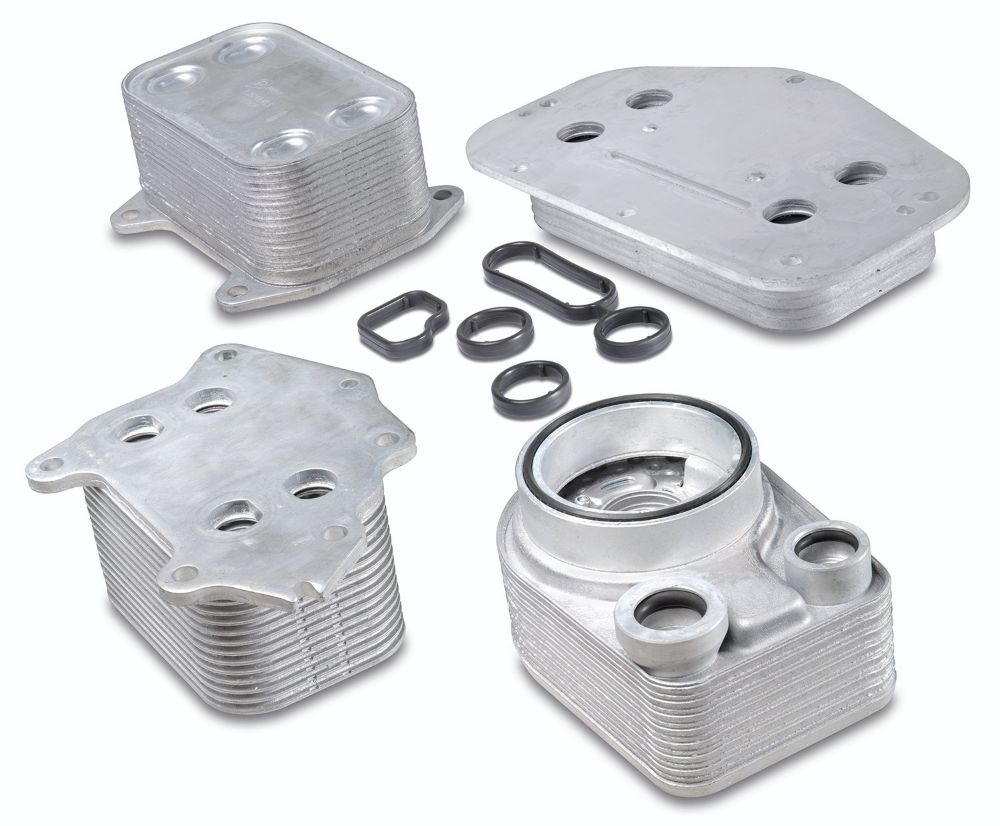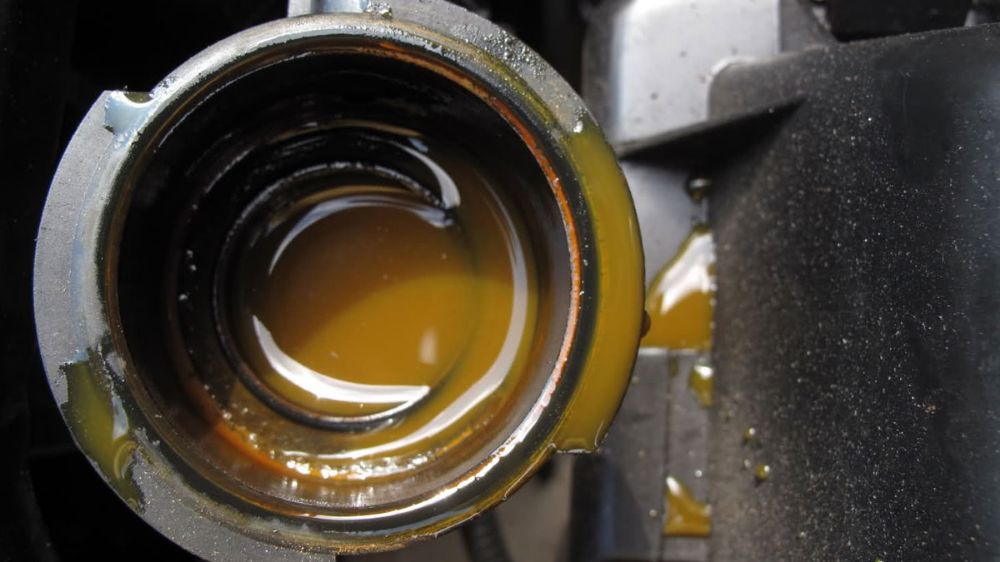Oil Coolers Unveiled: Understanding Their Importance and Functionality

Introduction:
When it comes to maintaining optimal engine performance and preventing overheating, an oil cooler plays a crucial role. In this comprehensive article, we will delve into the world of oil coolers, discussing their types, functions, benefits, and common questions. So, buckle up and get ready to explore everything you need to know about oil coolers!
Understanding Oil Coolers:
An oil cooler is a device designed to regulate the temperature of engine oil or gearbox oil, ensuring it remains within a safe operating range. By dissipating heat from the oil, an oil cooler helps to maintain its viscosity, lubricating properties, and overall efficiency.
Types of Oil Coolers:
-
Engine Oil Cooler: This type of oil cooler is specifically dedicated to cooling the engine oil. It is typically installed in the engine's cooling system, utilizing coolant or external air to lower the temperature of the oil.
-
Gearbox Oil Cooler: As the name suggests, a gearbox oil cooler is responsible for cooling the oil in the transmission or gearbox. It prevents excessive heat buildup, which can lead to premature wear and damage to transmission components.
Why Are Oil Coolers Necessary?
Oil coolers are essential for several reasons:
- Temperature Regulation: By keeping the oil temperature within an optimal range, an oil cooler helps maintain proper lubrication, preventing engine damage caused by overheating.
- Extended Engine Life: Cooler oil ensures reduced friction and wear on engine components, prolonging the engine's lifespan.
- Improved Performance: By preventing oil from becoming too thin or too viscous, an oil cooler helps maintain consistent engine performance, even under demanding conditions.
Effectiveness of Oil Coolers:
Oil coolers are highly effective in managing oil temperatures. They can significantly reduce oil temperatures, allowing the oil to perform optimally and preventing potential engine damage due to overheating.
Coolant and Oil Cooler:
In some cases, an engine oil cooler may utilize the engine's coolant system to regulate oil temperature. By passing the oil through a heat exchanger, the coolant absorbs heat from the oil, maintaining its temperature within a safe range.
Adding Horsepower with an Oil Cooler:
While an oil cooler itself doesn't directly add horsepower, it helps maintain the engine's performance by preventing power-robbing issues caused by overheating. By keeping the oil at an optimal temperature, an oil cooler ensures consistent power delivery.
Replacing an Engine Oil Cooler:
There are instances when an engine oil cooler may need replacement, especially if it becomes clogged, damaged, or develops leaks. Regular maintenance, including checking for leaks and cleaning the cooler, can help prolong its lifespan. Consult with a professional mechanic if a replacement becomes necessary.
Leakage Issues with Oil Coolers:
Oil cooler leaks can occur due to various reasons, such as damaged seals, corrosion, or physical damage. It's crucial to address leaks promptly to prevent oil loss and potential engine damage. Professional inspection and repair are recommended in such cases.
Oil Cooling vs. Water Cooling:
Both oil cooling and water cooling have their advantages. Oil cooling offers superior heat dissipation properties, while water cooling is more effective in regulating overall engine temperature. Many modern engines use a combination of both systems to achieve optimal cooling performance.
The Impact of Oil Cooler on Engine Temperature:
Oil coolers can significantly reduce engine temperatures, but the exact temperature reduction depends on various factors such as the cooler's design, size, and efficiency. It is best to consult your vehicle's manufacturer specifications for precise temperature reduction estimates.
Frequency of Oil Cooler Failures:
Oil coolers are generally reliable, but failures can occur due to various reasons, including clogs, leaks, and physical damage. Regular inspection and maintenance can help identify potential issues and prevent major failures.
Radiator with or without an Engine Oil Cooler:
The choice between a radiator with or without an engine oil cooler depends on various factors, such as the vehicle's cooling requirements and operating conditions. In some cases, a separate oil cooler may be added for enhanced cooling performance, while in others, an integrated radiator with an oil cooler is sufficient.
Causes of Oil Cooler Damage:
Oil coolers can be damaged by various factors, including physical impact, corrosion, overheating, and coolant contamination. Regular maintenance, prompt repairs, and avoiding harsh operating conditions can help prevent damage.
Oil Cooler and Oil in the Radiator:
Oil coolers and radiators are separate components, but if an oil cooler fails or develops leaks, it can lead to oil mixing with the coolant in the radiator. This contamination requires immediate attention and repair to prevent further damage to the engine.

Pros and Cons of Oil-Cooled Engines:
Oil-cooled engines offer certain advantages, such as simplicity, lighter weight, and efficient cooling in extreme conditions. However, they may also have limitations, including the potential for higher oil temperatures and the need for effective cooling airflow.
Diesel Oil Cooler Operation:
Diesel engines often employ oil coolers to manage the higher heat generated during operation. The oil cooler helps regulate oil temperature, ensuring proper lubrication and preventing engine damage.
Oil Cooler Location:
The location of an oil cooler varies depending on the vehicle's make and model. In some cases, it may be mounted near the radiator, while in others, it may be integrated into the engine or transmission assembly.
Coolant Mixing with Engine Oil:
Coolant mixing with engine oil is a serious issue that can indicate a problem with the head gasket, cylinder head, or engine block. It requires immediate attention to prevent further damage and costly repairs.
Key Takeaways:
- Oil coolers play a vital role in regulating oil temperature and maintaining engine performance.
- There are two main types of oil coolers: engine oil coolers and gearbox oil coolers.
- Oil coolers help prevent engine damage caused by overheating and extend the engine's lifespan.
- They can be cooled by coolant or external airflow, depending on the design.
- Oil coolers are effective in managing oil temperature and improving engine performance.
- Regular maintenance, inspection, and prompt repairs are crucial for the longevity of oil coolers.
FAQ Section:
Q: What does an engine oil cooler do?
A: An engine oil cooler helps regulate the temperature of the engine oil, preventing overheating and maintaining optimal lubrication.
Q: Is an engine oil cooler necessary?
A: Engine oil coolers are essential, especially in high-performance or heavy-duty applications, as they prevent oil from overheating and ensure engine longevity.
Q: How effective are engine oil coolers?
A: Engine oil coolers are highly effective in regulating oil temperature, preventing excessive heat buildup, and maintaining engine performance.
Q: Does an engine oil cooler use coolant?
A: Some engine oil coolers utilize the engine's coolant system to regulate oil temperature, while others rely on external airflow for cooling.
Q: Does an oil cooler add horsepower?
A: While an oil cooler itself doesn't directly add horsepower, it helps maintain consistent performance by preventing power loss due to overheating.
Q: Why should I replace an engine oil cooler?
A: Engine oil coolers may need replacement if they become clogged, damaged, or develop leaks, as these issues can impact engine performance and longevity.
Q: Does an oil cooler leak oil?
A: Oil cooler leaks can occur due to damaged seals, corrosion, or physical impact. Prompt repair is necessary to prevent oil loss and engine damage.
Q: Is oil cooling better than water cooling?
A: Oil cooling and water cooling have their advantages. Oil cooling offers superior heat dissipation, while water cooling is effective in regulating overall engine temperature. Many systems combine both methods for optimal cooling performance.
Q: How much does an oil cooler reduce engine temperature?
A: The exact temperature reduction depends on the cooler's design and efficiency. Consult the vehicle's manufacturer specifications for specific temperature reduction estimates.
Q: How often do oil coolers fail?
A: Oil coolers are generally reliable, but failures can occur due to clogs, leaks, or damage. Regular inspection and maintenance can help identify potential issues and prevent major failures.
Q: Is it better to have a radiator with or without an engine oil cooler?
A: The choice depends on the vehicle's cooling requirements and operating conditions. In some cases, a separate oil cooler may be added, while in others, an integrated radiator with an oil cooler is sufficient.
Q: Why does an oil cooler get damaged?
A: Oil coolers can be damaged by physical impact, corrosion, overheating, and coolant contamination. Regular maintenance, prompt repairs, and avoiding harsh operating conditions can help prevent damage.
Q: Can an oil cooler cause oil to mix with the radiator?
A: If an oil cooler fails or develops leaks, it can lead to oil mixing with the coolant in the radiator. Immediate attention and repair are necessary to prevent further engine damage.
Q: What are the pros and cons of oil-cooled engines?
A: Oil-cooled engines offer simplicity, lighter weight, and efficient cooling in extreme conditions. However, they may have limitations such as higher oil temperatures and the need for effective cooling airflow.
Q: How does a diesel oil cooler work?
A: Diesel oil coolers help regulate oil temperature in diesel engines, preventing overheating and ensuring proper lubrication. They dissipate heat from the oil, maintaining its performance and protecting the engine.
Q: Where is an oil cooler located?
A: The location of an oil cooler varies depending on the vehicle's make and model. It can be mounted near the radiator, integrated into the engine, or positioned within the transmission assembly.
Q: Why is coolant mixing with engine oil?
A: Coolant mixing with engine oil indicates a problem with the head gasket, cylinder head, or engine block. It requires immediate attention to prevent further damage and costly repairs.
Conclusion:
In conclusion, understanding the significance of an oil cooler is essential for maintaining a well-functioning and long-lasting engine. Whether it's an engine oil cooler or a gearbox oil cooler, these components play a crucial role in regulating oil temperature and ensuring optimal lubrication. By dissipating heat and preventing overheating, oil coolers help protect the engine from damage and extend its lifespan.
Regular inspection, maintenance, and prompt repairs are vital to keeping the oil cooler in optimal condition. Checking for leaks, cleaning the cooler, and addressing any issues promptly will help ensure its effectiveness and prevent major failures.
Oil coolers offer numerous benefits, including improved engine performance, extended engine life, and consistent power delivery. They are particularly beneficial in high-performance or heavy-duty applications where engines are subjected to intense heat and demanding conditions.
By understanding the functions, types, and benefits of oil coolers, you can make informed decisions regarding their maintenance and replacement. Remember to consult your vehicle's manufacturer specifications and seek professional assistance when necessary.
So, keep your engine cool, and your oil flowing smoothly, and enjoy the peace of mind that comes with a well-maintained oil cooler. Take care of your engine, and it will take care of you on your journeys ahead.


